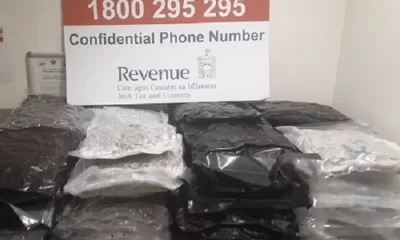Business
South Dakota Police Commission Approves Officer Applicants with Cannabis Records

Two law enforcement officers seeking certification were recently forgiven for their past cannabis use.
Recently in South Dakota, two law enforcement officers were forgiven by the South Dakota Law Enforcement Officers Standards Commission for cannabis use. According to the South Dakota Searchlight, the commission made decisions on more than a dozen pending certifications and recertifications, of “officers, canine units, and reciprocity for out-of-state or Indian Country officers seeking state certification.” Many “officer hopefuls” attended a commission meeting on July 12 to make their case.
The first was Officer Kody Beckers, who previously pleaded guilty to possession of THC wax when he was a freshman in college in 2015. “I’m not going to fabricate an excuse. It was a mistake. I was in college, my freshman year,” Beckers said. “Looking back at it now was a blessing in disguise for me. I turned my whole act around.”
He earned his undergraduate degree at Minnesota State University, and later earned a law enforcement certification at Alexandria Technical and Community College. “I wanted to find a way to obtain my sense of purpose in helping people,” Beckers continued.
South Dakota law prohibits the commission from certifying officer applicants who have pleaded guilty to a felony, however exceptions can be granted “for those given a suspended imposition of sentence in the state,” wrote the South Dakota Searchlight.
After discussing if the commission has the power to certify Beckers, they agreed to do so. “I think that this is an appropriate consideration for this board,” said commission member Tom Wollman. “We have pretty clear authority under our state law. It gives us that discretion.”
The second case pertained to a current sheriff’s deputy, Alicen Fladland, who will still be allowed to be certified as an officer even though she has a registered tribal medical cannabis card with the Flandreau Santee Sioux Tribe to manage pain she experienced following her knee surgery in 2022. “I am an honest and hard-working person and I will do whatever I can to improve our community,” Fladland said.
According to Hank Prim, law enforcement trainer for the Division of Criminal Investigation, also spoke in support of Fladland’s case. “She was honest on her application,” said Prim. “Had she not been honest on her application, there’s a good chance that the law enforcement commission would not have known about it.”
Many Native American tribes have begun to legalize medical and/or recreational cannabis on tribal land, and benefitting from sales. The Flandreau Santee Sioux Tribe was one of the first in the U.S. to legalize medical cannabis after the Department of Justice’s Cole Memorandum was issued in 2014, and it was also the first dispensary to open in South Dakota.
However, last year the Flandreau Santee Sioux Tribe told AP News last year that police have arrested more than 100 people who had medical cannabis cards and were buying cannabis at their dispensary. The tribe has issued approximately 8,000 medical cannabis cards to both tribe members, as well as non-tribe members.
According to Flandreau Police Chief Zach Weber, these arrests are valid according to the South Dakota Department of Public Safety and attorney general’s office. “If they have a tribally-issued card and they are non-Native American, we seize the card and any of the marijuana products that they would have,” Weber said.
Recreational cannabis is currently illegal in South Dakota, and although many advocates have worked to get legalization on the ballot, it has failed twice so far.
In June, South Dakota State Rep. Fred Deutsch said he was going to get a medical card just to test the medical cannabis system, although he also said he didn’t plan to buy any cannabis. Previously, Deutsch urged other representatives to vote against a bill that would expand the list of qualifying conditions for eligibility. “Doctors can make a hell of a lot of money just opening up their ‘Doc in a Box Shop,’ and that concerns me,” Deutsch said. “That should concern everybody. I mean, come on. If we’re talking about medical marijuana, we should allow people that really need it to have access to it, and we should prevent people that don’t need it from getting access to it as well.”
Business
New Mexico cannabis operator fined, loses license for alleged BioTrack fraud

New Mexico regulators fined a cannabis operator nearly $300,000 and revoked its license after the company allegedly created fake reports in the state’s traceability software.
The New Mexico Cannabis Control Division (CCD) accused marijuana manufacturer and retailer Golden Roots of 11 violations, according to Albuquerque Business First.
Golden Roots operates the The Cannabis Revolution Dispensary.
The majority of the violations are related to the Albuquerque company’s improper use of BioTrack, which has been New Mexico’s track-and-trace vendor since 2015.
The CCD alleges Golden Roots reported marijuana production only two months after it had received its vertically integrated license, according to Albuquerque Business First.
Because cannabis takes longer than two months to be cultivated, the CCD was suspicious of the report.
After inspecting the company’s premises, the CCD alleged Golden Roots reported cultivation, transportation and sales in BioTrack but wasn’t able to provide officers who inspected the site evidence that the operator was cultivating cannabis.
In April, the CCD revoked Golden Roots’ license and issued a $10,000 fine, according to the news outlet.
The company requested a hearing, which the regulator scheduled for Sept. 1.
At the hearing, the CCD testified that the company’s dried-cannabis weights in BioTrack were suspicious because they didn’t seem to accurately reflect how much weight marijuana loses as it dries.
Company employees also poorly accounted for why they were making adjustments in the system of up to 24 pounds of cannabis, making comments such as “bad” or “mistake” in the software, Albuquerque Business First reported.
Golden Roots was fined $298,972.05 – the amount regulators allege the company made selling products that weren’t properly accounted for in BioTrack.
The CCD has been cracking down on cannabis operators accused of selling products procured from out-of-state or not grown legally:
- Regulators alleged in August that Albuquerque dispensary Sawmill Sweet Leaf sold out-of-state products and didn’t have a license for extraction.
- Paradise Exotics Distro lost its license in July after regulators alleged the company sold products made in California.
Golden Roots was the first alleged rulebreaker in New Mexico to be asked to pay a large fine.
Source: https://mjbizdaily.com/new-mexico-cannabis-operator-fined-loses-license-for-alleged-biotrack-fraud/
Business
Marijuana companies suing US attorney general in federal prohibition challenge

Four marijuana companies, including a multistate operator, have filed a lawsuit against U.S. Attorney General Merrick Garland in which they allege the federal MJ prohibition under the Controlled Substances Act is no longer constitutional.
According to the complaint, filed Thursday in U.S. District Court in Massachusetts, retailer Canna Provisions, Treevit delivery service CEO Gyasi Sellers, cultivator Wiseacre Farm and MSO Verano Holdings Corp. are all harmed by “the federal government’s unconstitutional ban on cultivating, manufacturing, distributing, or possessing intrastate marijuana.”
Verano is headquartered in Chicago but has operations in Massachusetts; the other three operators are based in Massachusetts.
The lawsuit seeks a ruling that the “Controlled Substances Act is unconstitutional as applied to the intrastate cultivation, manufacture, possession, and distribution of marijuana pursuant to state law.”
The companies want the case to go before the U.S. Supreme Court.
They hired prominent law firm Boies Schiller Flexner to represent them.
The New York-based firm’s principal is David Boies, whose former clients include Microsoft, former presidential candidate Al Gore and Elizabeth Holmes’ disgraced startup Theranos.
Similar challenges to the federal Controlled Substances Act (CSA) have failed.
One such challenge led to a landmark Supreme Court decision in 2005.
In Gonzalez vs. Raich, the highest court in the United States ruled in a 6-3 decision that the commerce clause of the U.S. Constitution gave Congress the power to outlaw marijuana federally, even though state laws allow the cultivation and sale of cannabis.
In the 18 years since that ruling, 23 states and the District of Columbia have legalized adult-use marijuana and the federal government has allowed a multibillion-dollar cannabis industry to thrive.
Since both Congress and the U.S. Department of Justice, currently headed by Garland, have declined to intervene in state-licensed marijuana markets, the key facts that led to the Supreme Court’s 2005 ruling “no longer apply,” Boies said in a statement Thursday.
“The Supreme Court has since made clear that the federal government lacks the authority to regulate purely intrastate commerce,” Boies said.
“Moreover, the facts on which those precedents are based are no longer true.”
Verano President Darren Weiss said in a statement the company is “prepared to bring this case all the way to the Supreme Court in order to align federal law with how Congress has acted for years.”
While the Biden administration’s push to reschedule marijuana would help solve marijuana operators’ federal tax woes, neither rescheduling nor modest Congressional reforms such as the SAFER Banking Act “solve the fundamental issue,” Weiss added.
“The application of the CSA to lawful state-run cannabis business is an unconstitutional overreach on state sovereignty that has led to decades of harm, failed businesses, lost jobs, and unsafe working conditions.”
Business
Alabama to make another attempt Dec. 1 to award medical cannabis licenses

Alabama regulators are targeting Dec. 1 to award the first batch of medical cannabis business licenses after the agency’s first two attempts were scrapped because of scoring errors and litigation.
The first licenses will be awarded to individual cultivators, delivery providers, processors, dispensaries and state testing labs, according to the Alabama Medical Cannabis Commission (AMCC).
Then, on Dec. 12, the AMCC will award licenses for vertically integrated operations, a designation set primarily for multistate operators.
Licenses are expected to be handed out 28 days after they have been awarded, so MMJ production could begin in early January, according to the Alabama Daily News.
That means MMJ products could be available for patients around early March, an AMCC spokesperson told the media outlet.
Regulators initially awarded 21 business licenses in June, only to void them after applicants alleged inconsistencies with how the applications were scored.
Then, in August, the state awarded 24 different licenses – 19 went to June recipients – only to reverse themselves again and scratch those licenses after spurned applicants filed lawsuits.
A state judge dismissed a lawsuit filed by Chicago-based MSO Verano Holdings Corp., but another lawsuit is pending.
Source: https://mjbizdaily.com/alabama-plans-to-award-medical-cannabis-licenses-dec-1/
-

 Business2 years ago
Business2 years agoPot Odor Does Not Justify Probable Cause for Vehicle Searches, Minnesota Court Affirms
-

 Business2 years ago
Business2 years agoNew Mexico cannabis operator fined, loses license for alleged BioTrack fraud
-

 Business2 years ago
Business2 years agoAlabama to make another attempt Dec. 1 to award medical cannabis licenses
-

 Business2 years ago
Business2 years agoWashington State Pays Out $9.4 Million in Refunds Relating to Drug Convictions
-

 Business2 years ago
Business2 years agoMarijuana companies suing US attorney general in federal prohibition challenge
-

 Business2 years ago
Business2 years agoLegal Marijuana Handed A Nothing Burger From NY State
-

 Business2 years ago
Business2 years agoCan Cannabis Help Seasonal Depression
-

 Blogs2 years ago
Blogs2 years agoCannabis Art Is Flourishing On Etsy











